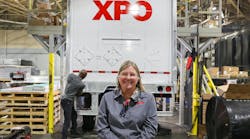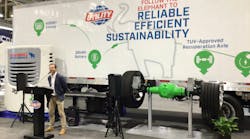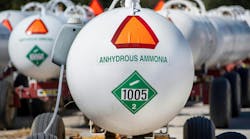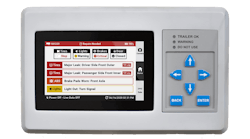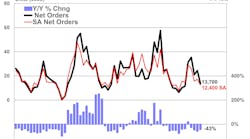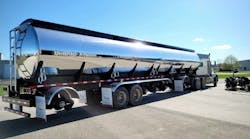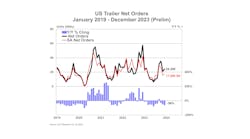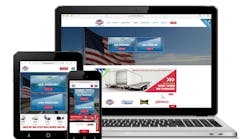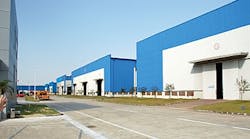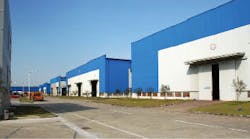The world just got a little smaller.
Conventional wisdom says that it's not feasible to set up a trailer manufacturing plant and sell thousands of those trailers to customers halfway around the world. But China's largest trailer manufacturer has a different idea.
China International Marine Containers (CIMC), which already has the lion's share of the intermodal container market, is implementing a plan to manufacture refrigerated trailers in China and sell them globally — particularly into North America and Europe.
The concept is similar to what the company has been doing with its Vanguard National Trailer Corporation subsidiary — but with substantially more manufacturing being performed in China.
From Vanguard's inception, when CIMC acquired the former HPA Monon trailer manufacturing complex and set up a U S production facility in 2004, Vanguard has produced its own line of dry-freight vans using steel components that CIMC fabricates and galvanizes in China. Vanguard does the rest — including the production of the aluminum sheet-and-post sidewalls, roof, and floor.
Under the new system, CIMC ships complete walls, roofs, floors, and rear door frames via container ship to the United States. Once delivered to the Vanguard complex in Monon, Indiana, the Chinese-built components are assembled into a van on the same assembly line that Vanguard uses to produce dry-freight vans. The trailers are then subsequently moved to a new CKD (complete knock-down) center that Vanguard is ramping up at the main campus in Monon, Indiana, for final assembly.
The major capital commitment, however, is the sprawling 520,000-sq-ft plant that CIMC has constructed to serve as the company's flagship facility for refrigerated trailers. The building, completed earlier this year, is just now coming on stream. With only limited production at this point, the empty areas of the facility speak volumes about what the company plans to do in the years to come.
The new manufacturing plant in Qingdao, China, produces complete walls, roofs, and floors and ships them via container vessel to the United States. It also builds complete trailers for the growing Chinese market, but the emphasis at the new plant clearly is on global production.
Eventually the plant will have two parallel assembly lines — one to produce trailers for the North American market and another that will assemble the sandwich construction that is the standard design for refrigerated trailers in Europe.
The plant is operated by Qingdao CIMC Reefer Trailer Company Ltd — a subsidiary CIMC formed two years ago to manufacture refrigerated trailers on a global basis. CIMC chose to build the facility in Qingdao, a coastal city with a population estimated at eight million that already was home for several CIMC manufacturing operations.
Construction of the refrigerated trailer plant began in March 2008, and the building was completed in December. Following three months of equipment installation, the facility was ready to begin production.
As of this moment, one production line has been installed and is in operation. The line was designed primarily to build reefer components for the U S market. A parallel line will be set up to build to similar kits with European specifications, along with specialized trailers for Australia and other markets as the global trailer market grows and additional capacity is needed.
At full capacity, the two lines will be able to produce at least 10,000 refrigerated trailers per year from a single shift. Until global trailer demand makes the second line necessary, CIMC will produce refrigerated trailer components for two continents on one assembly line.
CIMC can supply trailers either as completely assembled units or in kit form. The company has developed a steel cradle system that will enable the trailers to be loaded by crane onto cargo vessels with minimal damage. However, the company anticipates that most of the trailers sold in North America will be shipped knocked down and assembled at the Vanguard Trailer complex.
“We need to have a location in the United States,” says T H Huang, general manager of Qingdao CIMC Reefer Trailer. “We have shipped complete trailers to our facilities in South Gate, California, but it is difficult to eliminate damage. It also takes a long time to receive the order, build it, and ship it. By having an assembly plant in the United States, we can reduce damage, and we can offer the customer a refrigerated trailer built to his specifications in much less time.”
Revolutionary concept
CIMC is confident that the operation will bring changes to the global trailer market.
“This is a revolutionary model for the trailer business,” says David Li, deputy general manager of CIMC Vehicles Group and president of CIMC's operations in the United States. “It offers a number of advantages that provide more value for the customer.”
From CIMC's perspective, the Qingdao manufacturing plant and the CDK center in Monon combine to offer North American customers several benefits.
“This is still a people business,” Huang says. “CIMC Reefer will be a U S company, and customers there will be communicating directly with U S employees.”
The concept provides CIMC with manufacturing as well as shipping advantages. The actual production of the CIMC reefer in the United States will require substantially less floor space compared with what would be needed if the company were building the entire trailer here. The CDK concept also allows the company to handle fluctuations in production demand.
“This model allows us to provide better coverage of the market for less capital cost,” Huang says. “It is more adaptable to changes in the market. If this model works as well as we think it will, we will set up a similar operation in Europe.”
Freight is reduced on several levels. Obviously far more kits can be loaded onto a container ship than fully assembled trailers. But beyond that, the system reduces the distance major trailer components will have to travel. The reefers sold in the United States will be equipped with components that are produced in the United States. Products such as suspensions and axles will not need to be shipped to a CIMC plant in China only to return to the United States as part of a completed trailer.
Huang says the CKD concept also provides local jobs and pays local taxes, which would not be the case had the company built the entire trailer in China.
A path to expansion
CIMC envisions multiple CDK centers operating in the United States. The company may have figured out a way to get refrigerated trailer assemblies from China to North America on a competitive basis, but freight continues to be a concern.
“Once the trailers are assembled, we can serve a radius of 500 to 800 miles,” Huang says. “We expect to be able to produce 1,500 trailers in Monon. Once we exceed that, we will need another CKD center in another region.
“We want to be one of the top three reefer trailer manufacturers in the United States. Our target is to have a 20% market share of the reefer market in the United States. We have the experience and the manufacturing expertise. Our reefer container plant in Qingdao already manufactures 33% of the refrigerated containers produced worldwide. Add to that what we build at our Shanghai plant, and we have a 65% market share.”
Important addition
Offering a refrigerated trailer is expected to provide a big boost to Vanguard's product line, which already included sheet-and-post designs and composite dry-freight vans.
“The market does not regard you as a serious player without a refrigerated trailer,” Li says. “Leading trailer manufacturers have them. Having one makes our product lineup a more sufficient one, and it makes our company more attractive as we recruit. It's important to us to attract and retain high quality sales people, and it provides dealers with a necessary product.”
Much of the technology to be successful is already in place.
“We have been building refrigerated containers since 1996,” Li says. “About 40,000 of them are built annually. We know foaming.”
The company's standard reefer will be the R8000 Series, a 53-ft trailer that provides a 98-inch interior width and 104 inches of interior height.
But that's just the start. According to Steven Feng, assistant manager of international sales for CIMC Vehicles Group, the company will have a multi-temp refrigerated trailer ready in time for the Mid-America Trucking Show in March 2010.
